3 Microplastic Free Toothbrushes Made with Bamboo and Natural Bristles
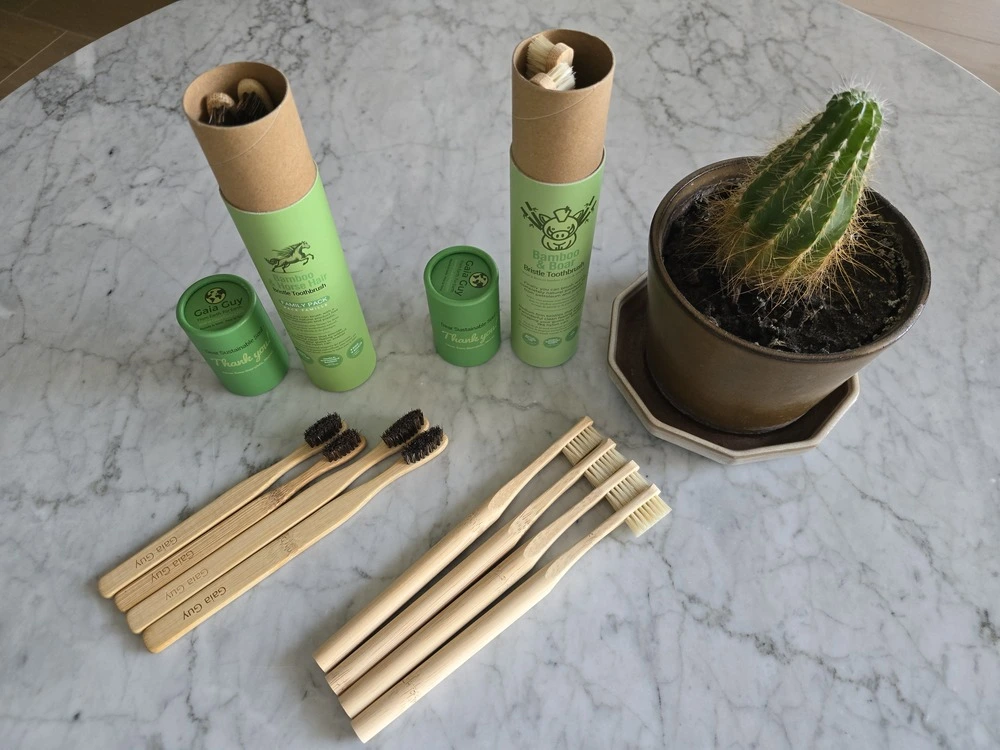
If you have tried to live sustainably and single-use plastic-free, one of the first swaps in your bathroom was replacing the classic plastic toothbrush with a bamboo toothbrush.
Cool, we did that too!
However, recently we discovered that it is not enough, there’s much more than that, and this is about your oral health, so keep reading!
The Environmental Issue with Plastic Toothbrushes
3.5 billion toothbrushes are sold each year globally, according to WWF Australia. Considering an average toothbrush weighs 15-20 grams, this equals 52,500-72,000 tonnes of landfill plastic. In the United States alone, roughly 1 billion toothbrushes are discarded each year according to the American Dentist Association (ADA). This equates over 50 million pounds of plastic toothbrush and packaging waste per year. No, a toothbrush cannot be easily recycled. The handle is usually made of polypropylene (PP) or polyethylene (PE) plastic, while the bristles are usually made of nylon. They are not biodegradable and contribute significantly to landfill waste and plastic pollution. The modern “bamboo toothbrush” was created exactly for this reason. Once you reach the end of life, you snap off the bamboo part, and you can either compost it, or repurpose it to use it for planters to identify seedlings, as an example.
Toothbrushes Release Microplastics with Every Brush Through Their Nylon Bristles Fragmentation
We recently we found out that there is also a health related issue regarding tooth brushing. The petroleum based bristles in toothbrushes release microplastics directly into your bloodstream while brushing your teeth, the same is true for petroleum based dental floss. This is due to the breakdown of the bristles, which are usually made of nylon or polybutylene terephthalate (BPT), triggered by mechanical forces, temperature, and PH in the oral environment.
A new study (1) published in The Microchemical Journal found that an average of up to 39 microplastics per day is released, with the least expensive brand generating the highest number of particles in various forms (fragments, fibers, films, and pellets).
A February 2024 study published in the Journal of Environmental Pollution (2) showed that up to 120 microplastic particles are ingested per brushing session. If you do the maths, and assuming people brush their teeth twice a day, that would equal to up to 88,000 particles per year.
Another study published in November 2023 in the Journal of Environmental Pollution (3) confirmed that toothbrushes can shed tiny plastic particles, and it used an advanced Raman imaging technique to clearly spot and map these particles. Scientists found that plastic toothbrushes can release debris or fragments into human mouths, which can potentially and adversely affect the digestive system, as they might work as transportation vehicles for bacteria, plasticiser additives like Bisphenol A (BPA), which can be found also in toothpaste, and other contaminants but more research is needed. Over the long term, this exposure triggers inflammation, damages the gut microbiome, increasing the risk of chronic diseases.
Related: 10 Best toothpaste without BPA
How to Reduce Microplastics Released from Plastic Toothbrushes
In the meantime, these are the recommndations by scientists:
- Frequently replace the toothbrush before the potential release of debris.
- Be cautious to use the toothbrush, gently.
- Always clean your toothbrush with water before and after use.
- To eliminate the problem completely, switch to toothbrushes made of 100% natural and organic components, also in the bristles.
3 Compostable Toothbrushes with Bristles Made of Natural Fibers that Do Not Shed Microplastics
At I’m Plastic Free we help you eliminate the issue at the source. For all the reasons outlined above, we provide our readers with alternatives solutions that do not release microplastics.
This post contains affiliate links, which means we may receive a small commission, at no cost to you, if you make a purchase through a link. This helps us continue the hard work we put into researching products and solutions.
Please Note: Our health content is for informational purposes only and is not intended as professional medical advice. Consult a medical professional on questions about your health. Please read our disclaimer.
1. Gaia Guy Natural Boar Bristle Bamboo Toothbrush (Nylon Free, plus Horse Hair & Bamboo Option Available)
Image Credit: I’m Plastic Free testing the Gaia Guy non-toxic toothbrushes
Gaia Guy has developed a product line of toothbrushes made with bamboo and boar hair bristles, with no nylon and no petrochemicals. These bristles come from a special breed of boar and are carefully harvested, then boiled to make them straighter and super hygienic for human use.
For those who are looking for softer bristles, ideal also for children, they also offer bamboo and horse hair bristle toothbrushes.
Packaging size: Both types are available in plastic free packs of 6, 8, and 12 packs. The family pack consists of 4 adults and 4 kids toothbrushes.
I personally tested both versions, and as I have receeding gums, I much prefer the horse hair bristles, as they are softer than the boar ones. I also immerged the bristles in warm water to soften the bristles before brushing (as recomended in the packaging) and it does work well!
Check the latest price on Amazon USA – Canada – UK – Australia
Shop Gaia Guy – 10% off with code IMPLASTICFREE
2. PRIMALS Boar Bristle & Bamboo ToothBrush (Nylon Free, plus Horse Hair & Bamboo Option Available)
PRIMALS’ boar bristles are ethically sourced and boiled to make them the perfect firmness and are fully hygenic. According to the manufacturer, boar bristles are also less abrasive than nylon bristles on your gums and enamel and have been used for centuries. The bristles are not glued but snugly woven into the bamboo brush head instead. The handle is made with a singular sleek piece of sustainable bamboo and, contrary to other competitive products, is able to stand on its own drying fast without getting mould at the bottom. Their products are available also with horse hair and are free from BPA, pthalates, PFAS and other endocrine-disrupting chemicals.
Packaging size: 4 packs
Check the latest price on Amazon USA – Canada
3. A Natural Toothbrush Alternative: The Miswak Stick
Miswak is a traditional chewing stick derived from the roots, twigs, and stem of the Salvadora persica tree, and has been used as a natural method for tooth cleaning in many parts of the world (Middle East, North Africa, and parts of the Indian subcontinent) for thousands of years. Scientific studies (4) have demonstrated that the miswak possesses antibacterial, anti-fungal, anti-viral, anti-cariogenic, and anti-plaque properties. They have also claimed that this root has anti-oxidant, analgesic, and anti-inflammatory effects, and have found that the mechanical and chemical cleansing efficacy of miswak chewing sticks are equal and at times greater than that of the toothbrush. However, it should be used gently along the gums to avoid gengival recession. If you have signs of gum recession, consult your dentist.
Packaging size: different versions depending on the supplier.
Check Miswak stick options on Amazon USA – Canada – UK – Australia
Related: 7 Best Plastic Free Razor Options for Zero-waste Shaving
Q&As
– Do 100% Plant-Based Bristles Toothbrushes Shed Microplastics?
If you are vegan, you can opt for bamboo toothbrushes made with plant-based bristles derived from castor oil instead of fossil fuels. This bioplastic is also called nylon (polyamide) PA11 and can biodegrade under certain temperature and humidity conditions. They are not fully biodegradable if discarded in the environment though. Also, as of now, there is no clear research that proves that castor oil based bioplastic does not shed microplastics. As we found for other products like tea bags, as an example, materials like polylactic acid (PLA) bioplastics may still shed microplastics, as confirmed by a 2023 study published in the Journal of Hazardous Materials (5), which found that polylactic acid bioplastic teabags release nanoplastic particles when steeped, and these particles can disrupt the gut barrier function by harming intestinal epithelial cells in an in vitro model.
Check the options on Amazon USA – Canada – UK – Australia
Check out Etee’s Bamboo Toothbrush with Replaceable Bamboo Heads and Castor Bean Oil Bristles
– Do Plastic Free Electric Toothbrush Heads Exist?
The short answers is, no, 100% plastic free electric toothbrush heads don’t exist. Boar bristles, or any natural bristles, are not suitable for the vigorous, high-speed movements of an electric toothbrush. They can be too rough, break easily, and do not hold up well to the required performance. Hence why there are no boar or horse bristle electric toothbrushes available on the market.
However, for the Australian and New Zealand markets, Crescent Nest have developed a sustainable electric toothbrush with replaceable bamboo heads that cuts plastic waste by 85% compared to manual products. The bristles are made of nylon PA11, made with castor oil. What I like about this product is that, you can buy a Care+ Membership subscription, which provides a fresh brush head delivered every 3 months, and free repairs or exchanges if you ever need them, making the product more circular than just linear. Check Out Crescent Nest. Get 10% off with code PF10.
Image Credit: Crescent Nest
For the North American markets (Canada and the USA), and the UK, MaxDent have developed a rechargeable bamboo electric toothbrush with soft bristles, also made with castor oil.
Check out MaxDent on Amazon USA – Canada – UK
– Are Charcoal Bristles Biodegradable?
You might think yes, as charcoal is biodegradable. However, the answer is no. Charcoal bristles are still made of nylon and are only infused with binchotan charcoal. We have yet to find plant-based charcoal bristles made with castor oil.
Charcoal toothbrushes have been marketed widely claiming lesser bacterial contamination because of the presence of activated charcoal and studies (6) confirm this. However, despite their antimacrobial properties, they can still release microplastics if they are made of nylon.
Conclusion: Natural Bristle Bamboo Toothbrushes for a Microplastic Free Oral Hygiene Are On The Rise
As you can see from the studies we higlighted in this article, there is an urgent need to transform the oral care industry by introducing products that not only perform and are fit for purpose, but also ensure that we do not ingest and absorb daily microplastics into our gums and blood stream by brushing our teeth daily. We’ll update this article as soon as we find more options for plastic free oral care products. At least, in the meantime, you can brush your teeth with completely natural products, free from petroleum and plastic.
Scientific Research Sources:
(1) https://www.sciencedirect.com/science/article/abs/pii/S0026265X2502034X
(2) https://pubmed.ncbi.nlm.nih.gov/38092338/
(3) https://www.sciencedirect.com/science/article/pii/S0269749123015129
(4) https://pmc.ncbi.nlm.nih.gov/articles/PMC4436748/
(5) https://pubmed.ncbi.nlm.nih.gov/37354720/
(6) https://pmc.ncbi.nlm.nih.gov/articles/PMC6104356/
Do you have any question or comments? Let us know in the comments section below.
Browse our directory to find plastic free oral care brands.
Comments
Marianne
November 9, 2025 at 10:31 amIt seems that in order to get away from plastics in things we use requires having a substantial income & NOT everyone makes six figures nor can they afford many of the non-plastic products available nor do they shop online. How can POOR people be more sustainable if financually everything that is sustainable is so far out of reach for our budgets?
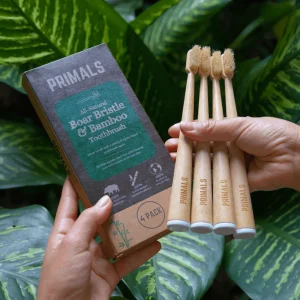
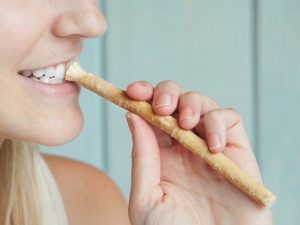
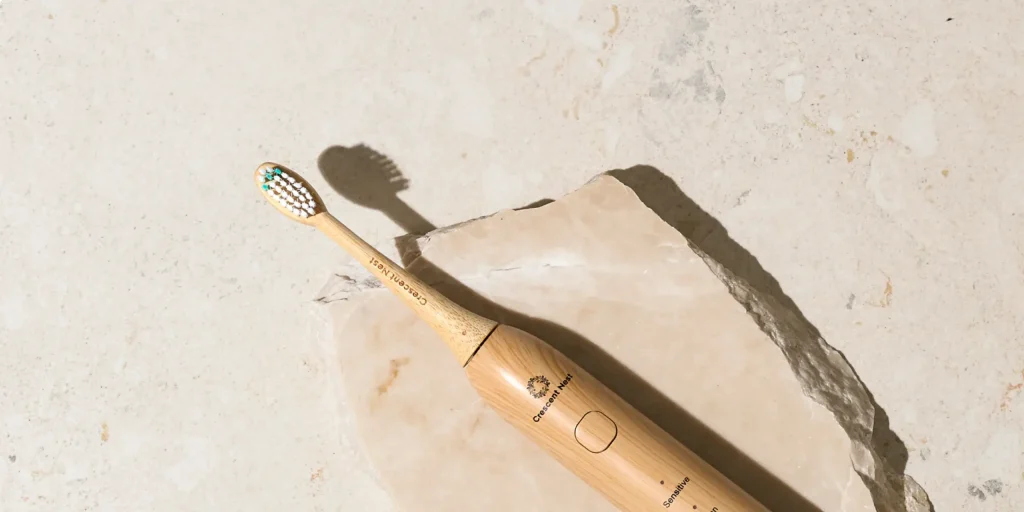

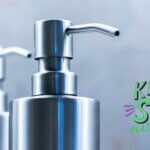
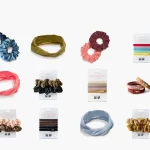

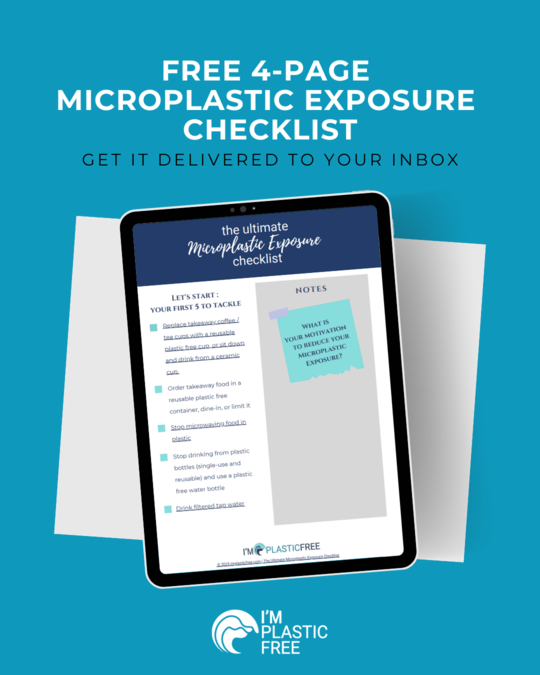
Cathleen Caffrey
August 26, 2025 at 11:45 amMy major concern about the alternative toothbrushes is that wood or bamboo may be harder to keep clean. Are there recommendations for how to clean them given they are way more expensive?
Thanks
I'm Plastic Free
August 26, 2025 at 5:34 pmHi Cathleen,
Thank you for your question, as we are still doing our research about this topic. For the Gaia Guy brand, the manufacturer recommends to replace the toothbrushes every 5 to 8 weeks. Submerging them in boiling water can help kill any germs or bacteria. To maintain them longer clean, they also recommend to rinse them thoroughly and allow to dry fully, possibly in the sun, as it’s a natural disinfectant.
We hope this helps.
Kind regards,
Simona